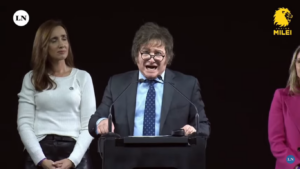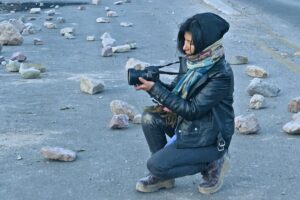Argentina is going through a political situation of total uncertainty. After ultra-conservative economist Javier Milei received the most votes in Argentina’s presidential primary, positioning him as the favorite for the general elections, the National Academy of Journalism (ANP, by its Spanish acronym) issued a statement condemning Milei’s recent verbal attacks on journalism.
"In most cases, Milei alluded in slanderous terms to journalism, without identifying anyone, which makes his offenses even more unfair," according to the ANP statement, signed by the president of the institution, Joaquín Morales Solá, and by the secretary, Silvia Naishtat. "In other cases, Milei's followers chanted, in front of the candidate, offensive refrains against journalists using names and surnames, and with proven false accusations."

Javier Milei in his campaign closing speech after primary elections in Argentina. (Youtube screenshot)
In his campaign closing speech, the presidential candidate referred to journalists as "roñosos [scabby]", a term associated with dirty and deteriorated things. On the same day, while Milei was voting at the National Technological University, the Tv Pública team that was covering the event was attacked. Journalist Gabriela Radice denounced on the spot that a group of people took away her microphone and began to attack her: "We are describing what’s happening. Someone has taken away my microphone, this is disrespectful, violent, it’s not the best way to work."
The ANP's communiqué exhorts the presidential candidates to "preserve a climate of democratic tolerance in public life, and to respect the duty of journalism to inform and its right to express diverse opinions."
Milei, 52, is the leader of the La Libertad Avanza party, and defines himself as a "libertarian." In the primary elections, he surpassed in votes the two political forces that have governed Argentina during the last two decades, the parties Juntos por el Cambio (led by former President Mauricio Macri) and Unión por la Patria (of the ruling Peronist-Kirchnerist coalition). Thus, he positioned himself as the favorite for the general presidential elections of October 2023. The candidate has been identified with proposals such as the dollarization of the economy, privatization of state-owned public companies, opposition to the legalization of abortion, among others.
In 2022, the Association of Argentine Journalistic Entities (ADEPA) accused Milei, who is also a national congressman, of "judicial persecution." The libertarian candidate took five journalists to court, accusing them of damaging his reputation and demanded his "right to reply," according to the national news outlet Clarín. Milei sought one million Argentine pesos from each of the journalists — Pablo Duggan, Fabián Doman, Paulo Vilouta, Débora Plager and Martín Candalaft —, who in their respective programs labeled Milei’s statements as "fascist," "Nazis," and "Hitlerian."
The Freedom of Expression + Democracy Foundation LED described the allegations as an "intimidation attempt aimed at reining in criticism or silencing any questioning and dissent of his work as a congressman or on the expression of his ideas as a political leader."
In its press release, ADEPA not only singled Melei out, but also expressed concern for the "growing intolerance toward the press." It included statements made by the current president, Alberto Fernández, who accused the media of "intoxicating people's heads." In the annual report "Limitations to the Exercise of Freedom of Expression - Argentina 2022," the LED Foundation highlighted that the confrontation between the government and the press, and the use of the courts as a tool for direct or indirect censorship, are the main obstacles in the country for the free practice of journalism.
The LED Foundation emphasized lawmakers’ use of concepts such as "fake news," "lawfare" and "hate speech" to "discredit journalists." Journalist Diego Rojas — who writes regularly for Infobae and lives in Buenos Aires — told LatAm Journalism Review (LJR) that it is "uncertain what will happen if Milei wins the general elections, as well as all the actions his presidency could develop." If he is elected, Milei said, he will eliminate official advertising in the media. The ANP has already condemned this possible action.
In 2022, there were 182 cases that constituted acts of direct or indirect censorship, and that limited the exercise of freedom of expression in Argentina, according to data from the LED Foundation. Camila Parodi, a feminist journalist, cultural anthropologist and member of the editorial collective Marcha, said freedom of expression is especially problematic for journalists covering or working from social and geographic periferies.
"The security situation of journalists in the country is closely related to the stance we have and the processes of struggle we inhabit," she told LJR. "Those of us who come from feminist journalism, popular journalism or independent news outlets are being persecuted and attacked," Parodi said. She said this violence is perpetrated against "journalists who are putting their bodies on the streets."

Camila Parodi, feminist journalist and cultural anthropologist. (Courtesy: Camila Parodi)
Parodi gave the example of Facundo Molares, an Argentine communist militant, former FARC fighter in Colombia and photojournalist, who died as a result of violence by the Buenos Aires police during a demonstration at the city’s Obelisk, days before the primaries. It should be noted that Molares was not practicing his profession at the time of the crackdown, but rather he was exercising his right to protest.
Another sphere where violence against journalists is perpetrated is in the virtual world, Parodi said. "We feminist journalists are being harassed all the time and on a daily basis by haters on social media and by all kinds of anti-rights attacks that seek to gain legitimacy in spaces not yet legislated."
Violence when reporting in the streets, particularly in Indigenous communities or the provinces and while covering demonstrations, often is perpetrated by police, Parodi said. She described it as follows: "Asking us not to broadcast, pushing us, taking pictures of us, pointing at us, that kind of control." Other examples Parodi gave are the recent aggressions against and arrests of journalists during protests in Jujuy, a province in northern Argentina, bordering Bolivia.
On June 20, the local JuJuy government led by Gerardo Morales approved a constitutional reform restricting the freedom to protest in the province. Such was the discontent of a broad sector of the population of Jujuy that during that month, and thereafter, massive marches and demonstrations were held against it. The Public Defender's Office in Argentina reported acts of persecution and aggression by security forces against protesters, intimidation with rubber bullets, surveillance and photographic records of journalists, as well as arrests, according to the news outlet Página 12.
The International Federation of Journalists (IFJ) expressed concern at the actions of the security forces which resulted in journalists being injured and detained. Among them is Daniel Bello, a photojournalist of the national agency Télam who was hit in the face with a rubber bullet. Also arrested were journalists Luciano Aguilar, of La Izquierda Diario, and Camilo Galli, of the news site El Submarino.
As a result of these events, the group Periodistas Unidxs Autoconvocadxs de Jujuy launched a special report in which they described the violation of journalists’ rights present at the June 2023 demonstrations in Jujuy and the difficulties they faced when carrying out their work. The collective denounced that after the crackdown there were dozens of detainees, almost a hundred criminal charges and more than 150 people were injured in total. Regarding the situation of journalists, they gathered several direct testimonies.

Johana Arce, journalist and photographer. (Courtesy: Johana Arce)
Johana Arce, journalist and photographer at Sisas Medio, lives in Jujuy and was attacked during the demonstrations. In an interview with LJR she said: "On June 20, there were rubber bullets. In my case, I was hit in the face, near the eye, while I was covering [the news] with the camera. On June 17, in Purmamarca, they broke my photographic equipment and a cell phone, in addition to blows I received while reporting."
Other press workers who covered the demonstrations also suffered "broken photographic equipment, beatings, arrests, rubber bullets, even when they were identified by their cameras and press credentials," Arce said. "This implies that there’s persecution when it comes to exercising this role of communication as press workers and there is no protection for communicators."
For Arce, "the goal of these aggressions and censorship on the part of the government is for information not to circulate and for terror to be engendered," since "there is fear of how it is communicated and under what circumstances it can happen again." She also believes, like Parodi, that the most affected are journalists of "community, independent, Indigenous and regional news outlets in the area."
--
Banner credit: ANRed, CC BY-SA 4.0 <https://creativecommons.org/licenses/by-sa/4.0>, via Wikimedia Commons.
Contributor Florencia Pagola is a freelance journalist from Uruguay. She does research and writes about human rights and freedom of speech in Latin America.